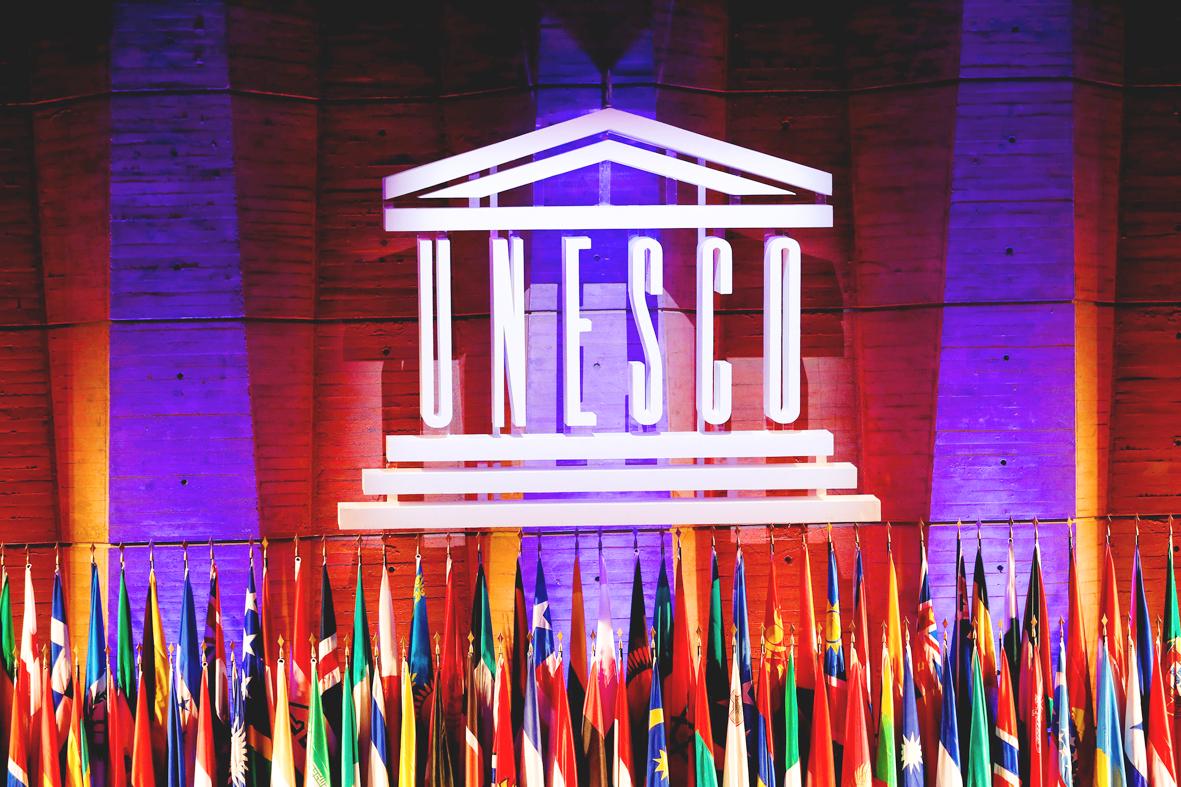Taiwanese are to be excluded from participating in all UNESCO-affiliated events, the International Centre for Theoretical Physics (ICTP) has confirmed, sources said yesterday.
The confirmation came after Taiwanese researchers — some at institutions abroad — had their applications to join a conference last month rejected.
The ICTP — an organization run jointly by the Italian government and UNESCO — is holding a virtual conference on quantitative biology, which began on Monday last week and runs until Friday next week.

Photo: Reuters
Registration for the conference was open until Nov. 15, but Taiwanese at various institutions around the world posted on Twitter and elsewhere over the past week that their applications had been rejected.
“Founded in 1964 by the late Nobel Laureate Abdus Salam, ICTP seeks to accomplish its mandate by providing scientists from developing countries with the continuing education and skills that they need to enjoy long and productive careers,” the organization’s Web site says.
One Twitter user wrote that the exclusion of Taiwanese was ironic, given that conference organizers were attempting to appear inclusive with the message “Female scientists are encouraged to apply” written on the bottom of a notice for the conference posted on the ICTP Web site.
“My advice for future @ictpnews @UNESCO event: Add an additional line ‘Taiwanese scientist will not be accepted’... so ppl won’t waste time applying for an opportunity they will be rejected from based on their country of origin,” Yeh Chih-fu (葉治甫), a Taiwanese doctoral student at Stanford University, wrote on Twitter on Wednesday.
Alexander Sullivan, fellow at the Washington-based Center for a New American Security think tank and a Georgetown University doctoral student, on Twitter criticized Beijing’s influence over UNESCO and its affiliated organizations.
“China has grown quite powerful within UNESCO, especially post US withdrawal under Trump. Shameful to see UNESCO further constricting not just Taiwan as a government, but individual scientists, as part of the PRC’s political agenda,” he wrote on Twitter on Thursday, referring to the People’s Republic of China.
Citing another researcher, Sullivan wrote that Chinese President Xi Jinping (習近平) has also been influencing archeology through UNESCO “as a way to tell the whole world a good story of Chinese history.”
Meanwhile, the US-China Economic and Security Review Commission on Tuesday published its annual report, whose Chapter 5 outlined concerns about Chinese encroachment on Taiwan and laid out recommendations for US action.
The commission recommended that the US secretary of state report on actions planned and taken by the US government to counter Beijing’s isolation of Taiwan, and to “strengthen support for Taiwan’s engagement with the international community, including [outlining] actions the administration will take should Beijing increase its coercion against Taiwan.”

The Central Election Commission has amended election and recall regulations to require elected office candidates to provide proof that they have no Chinese citizenship, a Cabinet report said. The commission on Oct. 29 last year revised the Measures for the Permission of Family-based Residence, Long-term Residence and Settlement of People from the Mainland Area in the Taiwan Area (大陸地區人民在台灣地區依親居留長期居留或定居許可辦法), the Executive Yuan said in a report it submitted to the legislature for review. The revision requires Chinese citizens applying for permanent residency to submit notarial documents showing that they have lost their Chinese household record and have renounced — or have never

A magnitude 5.6 earthquake struck off the coast of Yilan County at 12:37pm today, with clear shaking felt across much of northern Taiwan. There were no immediate reports of damage. The epicenter of the quake was 16.9km east-southeast of Yilan County Hall offshore at a depth of 66.8km, Central Weather Administration (CWA) data showed. The maximum intensity registered at a 4 in Yilan County’s Nanao Township (南澳) on Taiwan’s seven-tier scale. Other parts of Yilan, as well as certain areas of Hualien County, Taipei, New Taipei City, Taoyuan, Hsinchu County, Taichung and Miaoli County, recorded intensities of 3. Residents of Yilan County and Taipei received

Taiwan has secured another breakthrough in fruit exports, with jujubes, dragon fruit and lychees approved for shipment to the EU, the Ministry of Agriculture said yesterday. The Animal and Plant Health Inspection Agency on Thursday received formal notification of the approval from the EU, the ministry said, adding that the decision was expected to expand Taiwanese fruit producers’ access to high-end European markets. Taiwan exported 126 tonnes of lychees last year, valued at US$1.48 million, with Japan accounting for 102 tonnes. Other export destinations included New Zealand, Hong Kong, the US and Australia, ministry data showed. Jujube exports totaled 103 tonnes, valued at

BIG SPENDERS: Foreign investors bought the most Taiwan equities since 2005, signaling confidence that an AI boom would continue to benefit chipmakers Taiwan Semiconductor Manufacturing Co’s (TSMC, 台積電) market capitalization swelled to US$2 trillion for the first time following a 4.25 percent rally in its American depositary receipts (ADR) overnight, putting the world’s biggest contract chipmaker sixth on the list of the world’s biggest companies by market capitalization, just behind Amazon.com Inc. The site CompaniesMarketcap.com ranked TSMC ahead of Saudi Aramco and Meta Platforms Inc. The Taiwanese company’s ADRs on Tuesday surged to US$385.75 on the New York Stock Exchange, as strong demand for artificial intelligence (AI) applications led to chip supply constraints and boost revenue growth to record-breaking levels. Each TSMC ADR represents